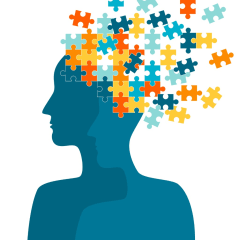Psych Therapy: A Comprehensive Guide to Outcomes and techniques

Cognitive-Behavioral Treatment
Cognitive-Behavioral Treatment (CBT) is a commonly used psychotherapeutic approach that focuses on identifying and customizing useless reasoning and actions patterns. Established in the 1960s by Aaron T. Beck, CBT incorporates behavior and cognitive concepts to resolve numerous psychological wellness concerns, consisting of depression, anxiety, and stress-related disorders.
Methods such as cognitive restructuring, direct exposure therapy, and skill-building workouts are frequently employed. Cognitive restructuring entails challenging and altering negative idea patterns, while direct exposure treatment aims to minimize anxiety and anxiety through steady direct exposure to been afraid items or circumstances.
Evidence-based study sustains the effectiveness of CBT for a wide variety of emotional disorders - Best Psychologist in Delhi. Its focus on ability procurement and self-help strategies empowers customers to proceed progression separately after treatment ends. The versatility and effectiveness of CBT have made it a keystone in modern psychotherapeutic practice
Psychodynamic Techniques
Rooted in the early theories of Sigmund Freud, psychodynamic approaches concentrate on exploring the unconscious mind and its influence on habits and emotions. These methods aim to discover concealed thoughts and feelings that may be driving maladaptive behaviors and emotional distress. Central to this technique is the principle of internal conflict, commonly originating from unsolved previous experiences, especially those from youth.
Therapists utilizing psychodynamic methods employ several crucial approaches, including cost-free organization, where individuals are urged to talk easily to disclose subconscious material, and desire analysis, which interprets the unrealized material of dreams. In addition, the expedition of transference and countertransference dynamics within the restorative connection is important. These interactions can give understandings right into the patient's interior globe and relational patterns.
Psychodynamic therapy is normally longer-term contrasted to various other methods, providing a extensive and deep understanding of the person's mind. Research shows that it can be particularly effective for complex mental health and wellness issues, such as individuality conditions and chronic clinical depression. By promoting self-awareness and emotional insight, psychodynamic treatment seeks to bring subconscious material to consciousness, enabling people to attain meaningful and long lasting adjustment in their lives.
Humanistic Techniques
Building on the structures laid by psychodynamic strategies, humanistic techniques offer an unique perspective concentrated on individual prospective and self-actualization. Coming from the mid-20th century, these methods focus on the inherent goodness and growth capacity of individuals, stressing a holistic view of human experience. Secret numbers such as Carl Rogers and Abraham Maslow have actually considerably influenced this restorative strategy, which encompasses methods like client-centered therapy and Gestalt therapy.
Client-centered treatment, created by Rogers, plays a pivotal role in humanistic techniques. The therapist's role is even more of a facilitator than an authority, urging customers to harness their inner resources for recovery.
Gestalt therapy, another vital humanistic technique, stresses existing moment recognition and the assimilation of body and mind. By focusing on the "here and currently," customers acquire greater understanding into their current feelings and habits. Techniques such as role-playing and assisted visualization are commonly utilized to help customers acquire a much deeper understanding of themselves, eventually leading to boosted self-awareness and satisfaction.
Integrative Therapies
Integrative treatments represent a synthesis of different therapeutic strategies tailored to satisfy the one-of-a-kind demands of each client. This method acknowledges the complexity of human psychology and the multifaceted nature of psychological health and wellness problems. By integrating elements from different institutions of psychotherapy-- such as cognitive-behavioral treatment (CBT), psychodynamic therapy, and humanistic techniques-- integrative therapies supply a more alternative and adaptable treatment paradigm.
Practitioners of integrative therapy analyze each customer's certain demands, signs, and individual history to design a customized treatment strategy. This individualized strategy boosts the potential for restorative success by dealing with the origin creates of psychological distress and promoting overall wellness. Strategies could include mindfulness workouts, cognitive restructuring, and psychological processing, each picked to target different elements of the client's concerns.
Furthermore, integrative therapies stress the therapeutic relationship, seeing the client-therapist bond as a crucial element of efficient treatment. This partnership fosters a supportive environment where customers feel risk-free to discover and resolve their issues. The flexibility of integrative treatments makes them appropriate for a broad variety of problems, including stress and anxiety, anxiety, trauma, and interpersonal difficulties, thus enhancing their applicability and efficiency in description varied medical settings.

Gauging Treatment Outcomes
Examining the performance of psychiatric therapy is important for both customers and clinicians to make sure that the therapy is yielding the wanted outcomes. To accomplish this, numerous methods and tools are used to gauge therapy results methodically. Standard assessment instruments, such as the Beck Clinical Depression Supply (BDI) and the Generalized Anxiety Disorder 7 (GAD-7), supply measurable data on sign extent and changes in time.
Along with standard devices, qualitative approaches like customer self-reports and clinical interviews use beneficial understandings into the personal experiences and perceived progress of clients. On a regular basis set up analyses, generally at browse around this site the beginning, axis, and end of therapy, assistance in tracking the trajectory of renovation or recognizing locations needing change.
Outcome measurement is not limited to sign reduction; it also incorporates useful renovations in day-to-day live, such as far better visit our website social relationships, raised job efficiency, and boosted general wellness. Modern developments in digital health have actually presented mobile apps and online systems that assist in real-time tracking and comments, further improving the evaluation process.
Ultimately, a thorough technique to measuring therapy end results makes sure that restorative interventions are reliable, effective, and customized to satisfy the private demands of clients, therefore maximizing the general healing experience.
Conclusion
Humanistic techniques focus on personal growth and self-actualization, while integrative therapies integrate several techniques for customized therapy strategies. Examining treatment outcomes via qualitative approaches and standard analyses ensures an extensive understanding of performance, inevitably assisting customers toward withstanding mental health enhancements.
From the organized technique of Cognitive-Behavioral Therapy (CBT) to the deep expedition of the subconscious in psychodynamic treatment, each technique brings distinct benefits. Its emphasis on skill purchase and self-help strategies empowers clients to continue development separately after therapy wraps up (Best Psychologist in Delhi). Secret figures such as Carl Rogers and Abraham Maslow have actually considerably influenced this therapeutic strategy, which includes approaches like client-centered treatment and Gestalt therapy
